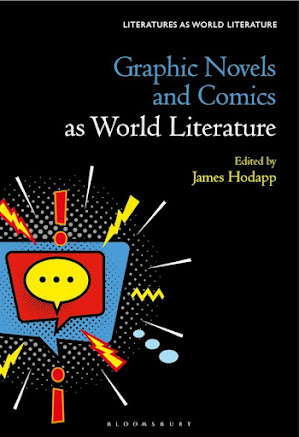Michelle Bumatay. On Black Bandes Dessinées and Transcolonial Power. Columbus: The Ohio State University Press, 2025. 155 pp. US $36.95 (Paperback). ISBN: 978-0-8142-5937-5. https://ohiostatepress.org/books/titles/9780814215821.html
Any time a new book appears that concentrates on a large segment of Africa and its comics art, celebration is in order, for the pickings have been slim. Anthologies of a particular cartoonist’s work, such as that of Zapiro, Barly Baruti, Marguerite Abouet, Gado, and other masters, are more readily available, as are biographical treatises and analytical monographs on specific characters. However, few continental or regional overviews exist.
So, a hearty welcome to Michelle Bumatay’s On Black Bandes Dessinées and Transcolonial Power, that consists of four chapters that analyze the works of Francophile West and West Central African cartoonists, from the Congo, Ivory Coast, and Cameroon.
The author sets the parameters of her study as being built around “key moments, artists and authors, themes, and publications” of Black bandes dessinées, which include, “political and editorial cartoons, serial publications and self-published magazines, anthologies, mainstream and independent albums, blogs, digital comics, and mobile apps” (15). Though the methodology of the work is missing, it seems to be a qualitative textual analysis with a small mixture of biographical analysis. Bumatay emphasizes the key role that the Franco-Belgian colonial heritage and ongoing imperialism have played on the development of Black bandes dessinées, as well as their effects on the artists, cautioning that the artist’s work varies from “individual to individual and from one project to another” (130), and that attention must be paid to context.
Notions about important West/West-Central African traits and issues are systematically analyzed/argued by Bumatay--that self-fashioning is a “crucial component” of Black cultures, exemplified in her case study of Kinshasa from the late 1960s to the 1990s; how Abouet markets her comics through the postcolonial exotic, and how she pushes for a “new inclusive understanding of universalism that demands a reworking of notions of gender, race, and power” (130); how Black bandes dessinées, for decades, have decried borderization’s (Northern migration) ruinous impacts, raising levels of brutalization, suffering, and indifference, and how these cartoonists have fashioned their styles to become “symbolic forms of restitution” of the world’s environment.
What Bumatay has achieved here is praiseworthy--giving her interpretations of the works of some African bandes dessinées cartoonists, supported by close readings of their works and backed up by similar notions and ideas of a host of researchers from different fields. That was her intention, well and good.
But, let me go off on a tangent--in no way, to devalue the merits of the author’s work--, and ask, are these interpretations aligned with what the artists intended? We don’t know unless journalists and researchers ask them, and, in this book, there does not appear to be evidence that any interviews that may have been done with the artists were used. It would not have been an onerous task for Bumatay to search for interviews in this high-tech age, and, if none is available, which is very unlikely, she could have conducted the interviews herself. Granted that interviewing was not a part of her research plan, so, maybe it can be a major part of her next research project.
The four artists discussed at length in On Black Bandes Dessinées… are still alive, active, and likely accessible. Barly Baruti (born 1959, in the Congo) has lived in Belgium since 1992; Marguerite Abouet (b. 1971, in Ivory Coast) resides in Romainville, France; Papa Mfumu’Eto 1er (b. 1963) is still in Kinshasa, Congo, and Japhet Miagotar most probably is still around, having been interviewed as recent as 2019. To make matters even easier should Bumatay choose to pursue a topic of this nature, much of the original art of Mfumu is being archived at the University of Florida, not far from where she is an assistant professor, Florida State University.
A suggestion for a future research project for an author whose book is being reviewed may seem to be out of place, and, it may be, but it was made with good intentions, one of which was to get my point across any way I could, that interviewing cartoonists while they are still with us is extremely important for comics scholarship. Okay, point made. Sorry, Ms. Bumatay, for the interruption.
To wrap up, On Black Bandes Dessinées and Transcolonial Power is a valuable contribution to comics scholarship, because it enlightens about cartooning in a part of the world where comics art research is sadly scarce; hones in on a few distinguished cartoonists, allowing for in-depth analysis; for the most part, soundly makes and defends its many arguing points, and employs a rich mixture of secondary sources.





